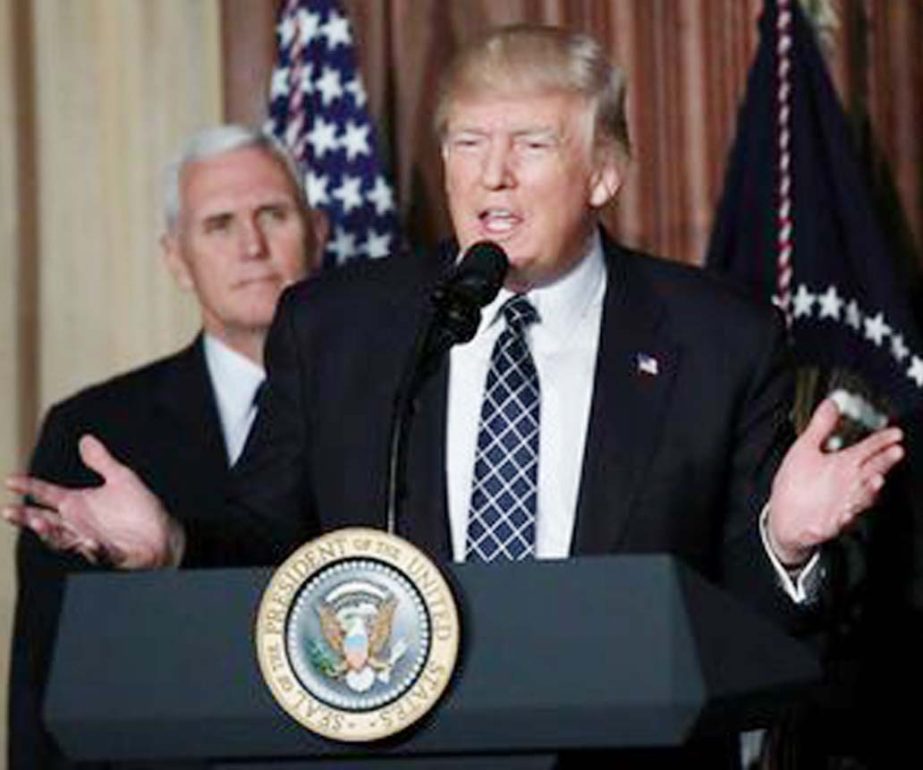
Reuters, Beijing :
Nations led by China and the European Union rallied around a global plan to slow climate change on Wednesday after U.S. President Donald Trump began undoing Obama-era plans for deep cuts in U.S. greenhouse gas emissions.
Trump’s order on Tuesday, keeping a campaign promise to bolster the U.S. coal industry, strikes at the heart of an international Paris Agreement in 2015 to curb world temperatures that hit record highs in 2016 for the third year in a row.
Many nations reacted to Trump’s plan with dismay and defiance, saying a vast investment shift from fossil fuels to clean energy such as wind and solar power is underway with benefits ranging from less air pollution to more jobs.
Chinese foreign ministry spokesman Lu Kang, whose government cooperated closely with former U.S. President Barack Obama’s administration on climate change, said all countries should “move with the times”.
“No matter how other countries’ policies on climate change, as a responsible large developing country China’s resolve, aims and policy moves in dealing with climate change will not change,” he said.
European Climate Commissioner Miguel Arias Canete said: “We see the Paris Agreement and the transition to a modern, more innovative economy as the growth engine of job creation, investment opportunities and economic prosperity.”
Trump’s main target is Obama’s Clean Power Plan, which required states to slash carbon emissions from power plants and was key to the U.S. pledge under Paris to cut emissions by between 26 and 28 percent below 2005 levels by 2025.
Trump did not say whether he would pull out of the Paris Agreement, agreed by almost 200 nations and which seeks a shift from fossil fuels this century as the cornerstone of efforts to limit heat waves, floods, droughts and rising sea levels.
The fear is that less action by the United States, the number two greenhouse gas emitter behind China, will cause other nations to roll back their own goals. The pact has been ratified so far by 141 nations ranging from Pacific island states to OPEC oil producers.
Nations led by China and the European Union rallied around a global plan to slow climate change on Wednesday after U.S. President Donald Trump began undoing Obama-era plans for deep cuts in U.S. greenhouse gas emissions.
Trump’s order on Tuesday, keeping a campaign promise to bolster the U.S. coal industry, strikes at the heart of an international Paris Agreement in 2015 to curb world temperatures that hit record highs in 2016 for the third year in a row.
Many nations reacted to Trump’s plan with dismay and defiance, saying a vast investment shift from fossil fuels to clean energy such as wind and solar power is underway with benefits ranging from less air pollution to more jobs.
Chinese foreign ministry spokesman Lu Kang, whose government cooperated closely with former U.S. President Barack Obama’s administration on climate change, said all countries should “move with the times”.
“No matter how other countries’ policies on climate change, as a responsible large developing country China’s resolve, aims and policy moves in dealing with climate change will not change,” he said.
European Climate Commissioner Miguel Arias Canete said: “We see the Paris Agreement and the transition to a modern, more innovative economy as the growth engine of job creation, investment opportunities and economic prosperity.”
Trump’s main target is Obama’s Clean Power Plan, which required states to slash carbon emissions from power plants and was key to the U.S. pledge under Paris to cut emissions by between 26 and 28 percent below 2005 levels by 2025.
Trump did not say whether he would pull out of the Paris Agreement, agreed by almost 200 nations and which seeks a shift from fossil fuels this century as the cornerstone of efforts to limit heat waves, floods, droughts and rising sea levels.
The fear is that less action by the United States, the number two greenhouse gas emitter behind China, will cause other nations to roll back their own goals. The pact has been ratified so far by 141 nations ranging from Pacific island states to OPEC oil producers.

